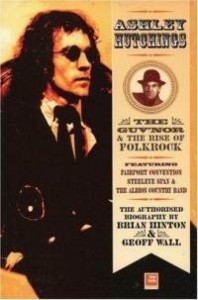By Natsumi Konokawa
Fairport Convention, Steeleye Span, Pentangle, and the Albion Band — these are familiar well-known bands of electric folk. In this musical genre, one man formed three of the above four — Ashley Hutchings. Ashley Hutchings organized the Fairport Convention, Steeleye Span, and the Albion Band. For these reasons, he is one of the most important artistes in the electric folk genre, and his organizing ability contributed to electric folk and its key bands. Without his creative effort, electric folk probably could not have succeeded and become popular as a music genre.
 Ashley Hutchings already displayed his organizing talent when he was young. According to Britta (2005), while still at school, bassist Hutchings founded and led a number of amateur bands in the north London area, and the Fairport Convention grew out of his project and took shape in 1967. Hutchings was 22 years old. Simon Nicol, who was a member of the band, said that “he (Hutchings) had a bulging address book and was always on the lookout for people who could play. That’s how I got brought into his net.â€Â Also, a famous American producer, Joe Boyd commented about other members, “[t]hey were all really great musicians with a lot of originality in their compositions and quite intelligent people.” From their comments, it can be seen that Hutchings was good at finding talented people. With many member changes, Fairport Convention came to form the true beginning of what was later to be called “electric folk.” Even after Hutchings left Fairport, the band played actively, and became the best British folk rock band in the late 1960s.
Ashley Hutchings already displayed his organizing talent when he was young. According to Britta (2005), while still at school, bassist Hutchings founded and led a number of amateur bands in the north London area, and the Fairport Convention grew out of his project and took shape in 1967. Hutchings was 22 years old. Simon Nicol, who was a member of the band, said that “he (Hutchings) had a bulging address book and was always on the lookout for people who could play. That’s how I got brought into his net.â€Â Also, a famous American producer, Joe Boyd commented about other members, “[t]hey were all really great musicians with a lot of originality in their compositions and quite intelligent people.” From their comments, it can be seen that Hutchings was good at finding talented people. With many member changes, Fairport Convention came to form the true beginning of what was later to be called “electric folk.” Even after Hutchings left Fairport, the band played actively, and became the best British folk rock band in the late 1960s.
Hutchings also showed his organizational skills with another band that contributed to electric folk. He gradually became more interested in traditional folk material and formed a new band in 1969 — Steeleye Span. According to Unterberger, “[a]side from Fairport Convention, Steeleye Span were the most successful and enduring British folk-rock band.†Hutchings tried to make a band devoted to the use of folk music in an electrified setting, and the band wanted to prove that it was possible to combine folk song material and electric instrumentation. The group’s core musicians, Maddy Prior and Tim Hart were not rock musicians at first, but a successful folk duo in London clubs. However, they agreed to join when asked by Hutchings. “They adopted the strategies of rock performances, including incorporating traditionally based theatrical elements.â€Â If Hutchings had not utilized their talent as rock musicians, the best band, Steeleye Span would not have made their important contribution to electric folk music genre.
After Steeleye Span, Hutchings formed a large scale band. He wanted to explore a different terrain, so he left Steeleye Span in 1971 and founded the first of the many Albion (Country) Bands. This band is generally considered one of the most important groupings in electric folk, and it has been associated with a large proportion of major English folk performers in its long and fluid history”. Steeleye band members disagreed with his decision to leave, but the person who filled Hutchings’ vacancy had a significant impact on the group. The same thing occurred when Hutchings left Fairport Convention. For example, a bass player, Rick Kemp (a member of Steeleye Span) brought strong rock and blues influences to the sound. Dave Pegg (a member of Fairport Convention) added a new, more complex bass style. Hutchings not only formed prominent bands, but also had an good influence on the bands that he left behind. In addition, Hutchings’ wife, Shirley Collins, recalled amusedly that “it got very complicated, because Ashley (Hutchings) kept inviting other people to come in and join in (the Albion (Country) Band).” With Hutchings as organizational leader, the Albion (Country) Band has united eminent musicians from folk and electric folk. As stated above, Hutchings contributed to electric folk’s fame by organizing the most important bands of the era which included many famous musicians.
Hutchings is now called ‘The Godfather of Folk-Rock.’ He is still very active today, in particular, with the Albion Band, his series of Morris music albums and the Rainbow Chasers. Of course, two biggest bands, the Fairport Convention and Steeleye Span also play actively even now. Hutchings formed three major bands whose power was strong enough to continue performing and attracting people for as many as 40 years. Hutchings had a great influence on electric folk. His ability to find people who had hidden talents as rock musicians and to organize outstanding bands helped the electric folk genre and its main bands to extend their influence. We probably cannot talk about electric folk today without remembering Ashley Hutching’s contributions.
Further Reading
Britta Sweers. Electric Folk, The Changing Face Of English Traditional Music. Oxford: Oxford University Press, 2005
Natsumi Konokawa is second-year student in the Department of British and American Cultural Studies
